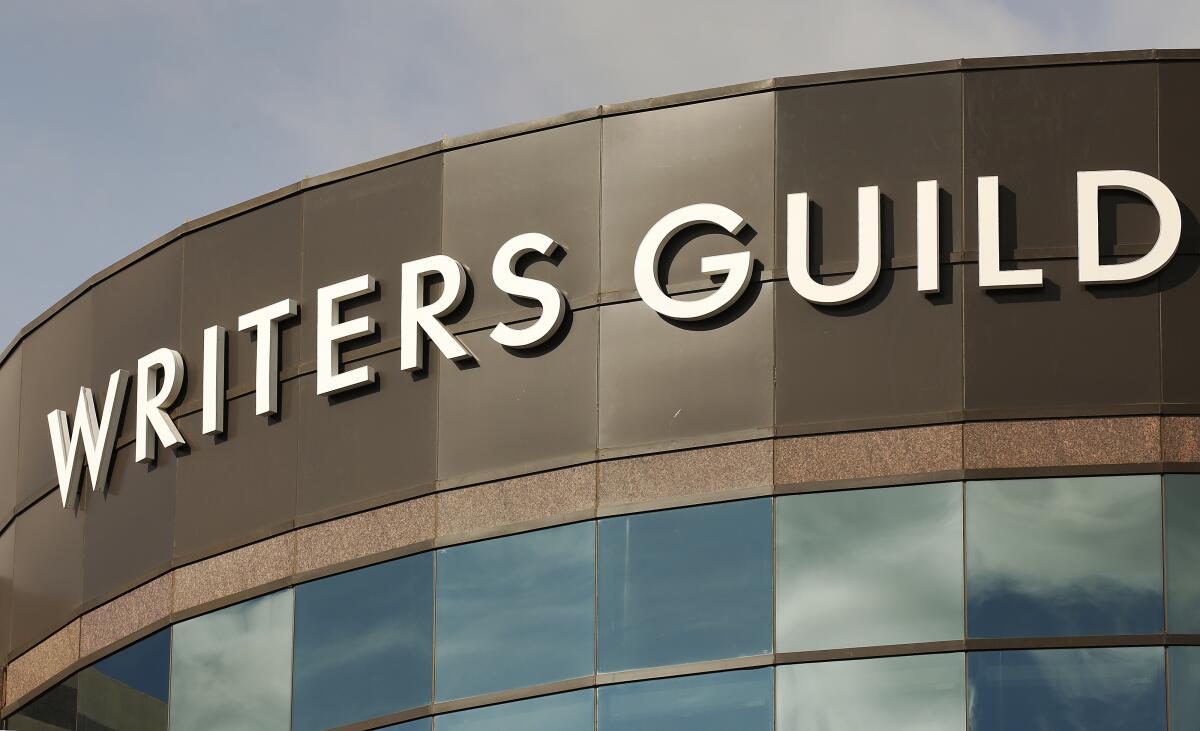Writers Guild members vote to authorize strike by record margin as contract deadline nears

- Share via
Leaders of the Writers Guild of America secured a strong showing of support from members on Monday, moving the union closer to a possible work stoppage that would disrupt Hollywood production and ripple across Southern California’s economy.
WGA members voted by a historic margin — 98% to 2% — (among 9,218 ballots cast) in favor of a strike authorization, which allows union leaders to call a walkout if they are unable to negotiate a new film and TV contract.
Streaming has transformed television and led to a surge in content, but it also has squeezed Hollywood writers. Five Writers Guild of America members share their stories.
“You have expressed your collective strength, solidarity, and the demand for meaningful change in overwhelming numbers,” the WGA said in a statement to members. “Armed with this demonstration of unity and resolve, we will continue to work at the negotiating table to achieve a fair contract for all writers.”
The current three-year contract, which covers about 11,500 members, expires May 1.
The vote — held April 11 to 17 — adds pressure to already high-stakes negotiations between the Alliance of Motion Picture and Television Producers and the Writers Guild of America over pay and conditions.
Layoffs, hints of a recession and an uncertain future for streaming add up to contentious negotiations as the WGA looks for a new deal with Hollywood studios.
The strong endorsement is likely to strengthen the leverage union leaders have in contract negotiations that have so far failed to yield much progress.
The radical transformation of the TV business caused by the rise of streaming platforms has fueled much of the labor conflict.
Writers are seeking a package of compensation increases valued at nearly $600 million. That includes increases in minimum pay and higher residual payments from streaming, along with increased contributions to the union’s health and pension plans.
Writers argue that despite the streaming boom, their median pay has fallen in the last decade, citing a WGA report.
Complicating matters is that major studios such as Walt Disney Co., Warner Bros. Discovery and Netflix are facing their own economic pressures to slash costs in the face of rising debt levels, a reassessment of the streaming business and a possible recession.
In a statement, the producers alliance said the ratification vote was not a surprise.
“Our goal is, and continues to be, to reach a fair and reasonable agreement,” spokesman Scott Rowe said. “An agreement is only possible if the Guild is committed to turning its focus to serious bargaining by engaging in full discussions of the issues with the companies and searching for reasonable compromises.”
Representatives of the producers alliance and the WGA returned to the table for talks April 14.
Unscripted programming is once again poised to serve as a stopgap for networks and streaming services, but since the last strike, it has matured into a formidable genre.
If they are unable to come to terms, WGA leaders could authorize a walkout as early as May 2 at 12:01 a.m. Pacific time, according to the WGA.
“We sense a very high likelihood of a strike beginning in early May 2023,” said Rich Greenfield, a co-founder of LightShed Partners, a technology and media research firm in New York. “The television business has shifted dramatically and resetting economics between the WGA/AMPTP is no easy task.”
This is the first time since 2017 that the guild has voted on a strike authorization, although that year the two sides were able to reach a deal that averted a work stoppage.
The WGA previously went on strike in 2007 in a walkout that lasted 100 days and halted much of Hollywood production. At the time, members approved a strike authorization by 90%.
Writers are seeking to address a number of practices that they say have steadily chipped away at their ability to earn a living in the streaming era.
One area is the use of mini-rooms, which employ small groups of writers who take on the burden of fleshing out episodes of a new TV show before it is greenlighted by a studio. These have led to the erosion of pay, the union says.
Los Angeles-based Brigitte Muñoz-Liebowitz, 38, showrunner of HBO Max’s comedy series “Gordita Chronicles,” said it was an easy decision to vote “yes” in favor of a possible strike.
“As a showrunner who ran a pre-greenlight mini-room, I have seen writer pay decline right before my eyes,” Muñoz-Liebowitz said. “People that have been working for a very long time are working for so much less than they ever have before.”
She hopes the vote will telegraph to the studios the writers’ resolve to strike to protect the viability of the profession.
“Sometimes a labor action like that is the only option we have if the studios aren’t willing to give us a deal that will fix the problems that we’ve identified,” Muñoz-Liebowitz said. “Nobody wants to go on strike, it’s a last resort.”
A strike would no doubt mean financial hardship for writers as well as cast and crew affected by production shutdowns.
L.A.-based TV and film writer Zoe Marshall, 30, has been writing since 2018 on various shows including the CW’s “Charmed.” The WGA board member said she is still paying off nearly $250,000 in student loans from film school.
Marshall, who supports many family members, recently married a TV show composer, but the couple have put off taking a honeymoon in case of a work stoppage.
Still, Marshall said she strongly supported the strike authorization.
“The cost of living in Los Angeles is the highest it’s ever been, the cost of an education is the highest it’s ever been, and the nature of this business and how we’re compensated requires me to ration out my checks over these extended periods of time,” Marshall said. “The studios are making these record profits, and they’re spending more than they ever have to produce this product that we practically kill ourselves to write. It’s categorically unfair, and it’s just wrong.”
More to Read
Inside the business of entertainment
The Wide Shot brings you news, analysis and insights on everything from streaming wars to production — and what it all means for the future.
You may occasionally receive promotional content from the Los Angeles Times.














